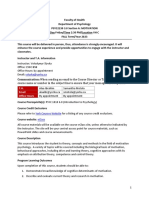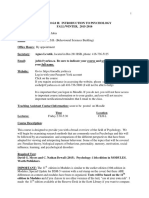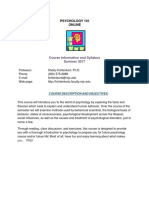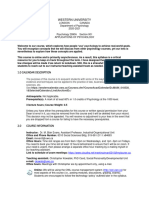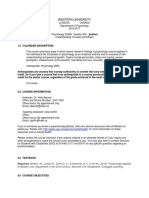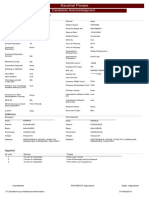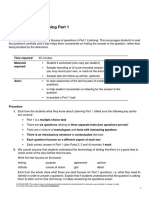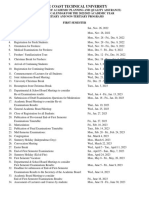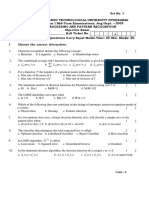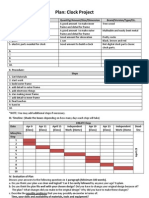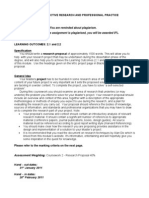Faculty of Health
Department of Psychology
PSYC 3480 3.0 B: PSYCHOLOGY OF WOMEN
Tuesday/14:30-17:30/ACW 206
Fall/2022
Instructor and T.A. Information
Instructor: Dr. Noreen Stuckless
Office Hours: Rm 214 BSB/email/phone, by appointment.
Email: stuckles@yorku.ca
T.A. Ruth Vanstone Danielle Christie
Email rnv85@yorku.ca Dc93@yorku.ca
Office Hours By appointment By appointment
(A-K) (L-Z)
Our course lectures will be delivered in-person in 206 ACW 206, Tuesday, 14:30-17:30.
PowerPoint lecture slides will be posted weekly. There will be opportunities for break out
discussion groups. The tests and assignment will be posted online during the class time.
Course Prerequisite(s): Course prerequisites are strictly enforced
HH/PSYC 1010 6.00 (Introduction to Psychology), with a minimum grade of C.
Course Credit Exclusions
Please refer to York Courses Website for a listing of any course credit exclusions.
Course website: Moodle
All course materials will be available on the course eClass site in addition to the class textbook.
Course Description
This course explores factors associated with the psychology of women, including gender-role
stereotypes, socialization practices, male-female differences, women and health, work and violence. At
all times, the interpretation offered is made with reference to the broader social context. The course
involves formal lectures including PowerPoint presentations by the instructor and possibly invited
guests. The required readings from the text are central to the course. The lectures will serve to enrich,
clarify, and illustrate crucial issues from the assigned readings. There will be a number of break-out
student discussions . Course credit exclusions: AK/PSYC 3700E 3.00 (prior to Summer 2001), AK/SOCI
3880A 3.00 (prior to Summer 2005), AK/SOCI 3390V 3.00 (prior to Fall/Winter 2001-2002).
1
�Program Learning Outcomes
Upon completion of this course, students should be able to:
1. Demonstrate in-depth knowledge on psychology of women.
2. Articulate trends in the psychology of women.
3. Express knowledge of the psychology of women in written form.
4. Describe and explain limits to generalizability of research findings on the psychology of
women.
5. Demonstrate ability to relate information on the psychology of women to own and
others’ life experiences.
Specific Learning Objectives
1. To appreciate and critically evaluate women’s roles in society.
2. To have a theoretical understanding of how gender identification develops.
3. To examine society’s perceptions and attitudes towards women and men and the
consequences of these perceptions and attitudes.
4. To acknowledge the advances that women have made over the years.
5. To understand the challenges facing women and girls in various societies ist here
course learning objectives that build on/extend the learning outcomes
Required Text
Matlin, M.W. and R.D. Foushee (2023), The Psychology of Women and Gender. Eighth edition. Cengage
Learning Inc. Textbook.
An eBook can be acquired via a link from the Bookstore posted on our eClass course.
Course Requirements and Assessment:
Assessment Date of Evaluation (if known) Weighting
Multiple Choice test, chpt 1-6, (100 October 25, 2022 ONLINE
minutes)
Reading Assignment November 1-3, 2022 ONLINE
Written answer test, 6, 8
10, 11, 12, 13 November 29, 2022 ONLINE
Final exam MC 7, 9, 11, 12, 13, 14,
TBD - ONLINE
15 (2 hours) 25%25%2
0%30%
2
�Test one will be 100 multiple choice questions to be completed online on October 25. It will be
worth 25% of the final grade.
The Reading Assignment will be posted online on November 1 to be completed November 1-3.
It will be worth 25% of the final grade. Students must do the Reading Assignment
independently.
The Written Answer test will be given online on November 29. You will have 2!/2 hours within a
24 hour window. It will be worth 20% of the final grade.
The Final Exam will be 120 multiple choice questions to be given online during the exam period.
It will be worth 30% of the final grade.
Please note that you are responsible for all the material in the text, lectures, and handout(s)
for the chapters above for your exams. The exams will include multiple choice and/or written
format questions.
Class Format and Attendance Policy
Class lectures will be given inperson during the class time. The tests and assignment will be posted and
completed online.
Grading as per Senate Policy
The grading scheme for the course conforms to the 9-point grading system used in
undergraduate programs at York (e.g., A+ = 9, A = 8, B+ - 7, C+ = 5, etc.). Assignments and
tests* will bear either a letter grade designation or a corresponding number grade (e.g. A+ = 90
to 100, A = 80 to 90, B+ = 75 to 79, etc.)
(For a full description of York grading system see the York University Undergraduate Calendar -
Grading Scheme for 2018-19)
Late Work/Missed Tests or Exams
For any missed quiz or late assignment, students MUST complete the following online form
which will be received and reviewed in the Psychology undergraduate office. At this time, due
to COVID-19, an Attending Physician’s Statement (APS) is not required, however, a reason for
missing an evaluated component in the course must be provided.
HH PSYC: Missed Tests/Exams Form. Failure to complete the form within 48 hours of the
original deadline will result in a grade of zero for the missed quiz or late assignment.
Students missing the midterm must notify the course director within 48 hours.
Add/Drop Deadlines
For a list of all important dates please refer to: Fall/Winter 2022-2023 - Important Dates
3
� FALL YEAR WINTER
(F) (Y) (W)
Last date to add a course without permission of
Sept. 20 Jan. 22
instructor (also see Financial Deadlines)
Last date to add a course with permission of
Oct. 4 Feb. 6
instructor (also see Financial Deadlines)
Drop deadline: Last date to drop a course without
Nov. 11 March 17
receiving a grade (also see Financial Deadlines)
Course Withdrawal Period (withdraw from a course
Nov. 12 – March 18 -
and receive a grade of “W” on transcript – see note
Dec.7 Apr. 11
below)
*Note: You may withdraw from a course using the registration and enrolment system after the
drop deadline until the last day of class for the term associated with the course. When you
withdraw from a course, the course remains on your transcript without a grade and is notated
as "W". The withdrawal will not affect your grade point average or count towards the credits
required for your degree.
Information on Plagiarism Detection
Turnitin (Not applicable)
Electronic Device Policy
Electronic devices can be used to take notes
Academic Integrity for Students
York University takes academic integrity very seriously; please familiarize yourself with
Information about the Senate Policy on Academic Honesty.
It is recommended that you review Academic Integrity by completing the Academic Integrity
Tutorial and Academic Honesty Quiz.
Test Banks
The offering for sale of, buying of, and attempting to sell or buy test banks (banks of test
questions and/or answers), or any course specific test questions/answers is not permitted in
the Faculty of Health. Any student found to be doing this may be considered to have breached
the Senate Policy on Academic Honesty. In particular, buying and attempting to sell banks of
test questions and/or answers may be considered as “Cheating in an attempt to gain an
improper advantage in an academic evaluation” (article 2.1.1 from the Senate Policy) and/or
“encouraging, enabling or causing others” (article 2.1.10 from the Senate Policy) to cheat.
Electronic Devices During a Test/Examination
Electronic mobile devices of any kind are not allowed during a test or examination. Students are
required to turn off and secure any electronic mobile device in their bag which is to be placed
under the chair while a test/exam is in progress. Any student observed with an electronic
4
�devise during a test/exam may be reported to the Undergraduate Office for a potential breach
of Academic Honesty. It is expected that you would complete tests/exams in a manner that
does not require consulting an unauthorised source during an examination unless the
tests/exams are open-book.
Academic Accommodation for Students with Disabilities
While all individuals are expected to satisfy the requirements of their program of study and to
aspire to do so at a level of excellence, the university recognizes that persons with disabilities
may require reasonable accommodation to enable them to do so. The York University
Accessibility Hub is your online stop for accessibility on campus. The Accessibility Hub provides
tools, assistance and resources. Policy Statement.
Policy: York University shall make reasonable and appropriate accommodations and
adaptations in order to promote the ability of students with disabilities to fulfill the academic
requirements of their programs.
The nature and extent of accommodations shall be consistent with and supportive of the
integrity of the curriculum and of the academic standards of programs or courses. Provided that
students have given sufficient notice about their accommodation needs, instructors shall take
reasonable steps to accommodate these needs in a manner consistent with the guidelines
established hereunder.
For Further Information please refer to: York university academic accommodation for students
with disabilities policy.
Course Materials Copyright Information
These course materials are designed for use as part of the PSYC 3480 B course at York
University and are the property of the instructor unless otherwise stated. Third party
copyrighted materials (such as book chapters, journal articles, music, videos, etc.) have either
been licensed for use in this course or fall under an exception or limitation in Canadian
Copyright law.
Copying this material for distribution (e.g. uploading material to a commercial third-party
website) may lead to a violation of Copyright law. Intellectual Property Rights Statement.
Calumet and Stong Colleges’ Student Success Programming:
Calumet and Stong Colleges aim to support the success of Faculty of Health students through a
variety of free programs throughout their university career:
Orientation helps new students transition into university, discover campus resources, and
establish social and academic networks.
Peer Mentoring connects well-trained upper-year students with first year and transfer
students to help them transition into university.
5
� Course Representative Program supports the academic success and resourcefulness of
students in core program courses through in-class announcements.
Peer-Assisted Study Sessions (PASS) involve upper-level academically successful and well-
trained students who facilitate study sessions in courses that are historically challenging.
Peer Tutoring offers one-on-one academic support by well-trained Peer Tutors.
Please connect with your Course Director about any specific academic resources for this
class.
Calumet and Stong Colleges also support students’ Health & Wellness, leadership and
professional skills development, student/community engagement and wellbeing, Career
Exploration, Indigenous Circle, awards and recognition, and provide opportunities to
students to work or volunteer.
For additional resources/information about Calumet and Stong Colleges’ Student Success
Programs, please consult our websites (Calumet College; Stong College), email
scchelp@yorku.ca, and/or follow us on Instagram (Calumet College; Stong College),
Facebook (Calumet College; Stong College) and LinkedIn.
Are you receiving our weekly email (Subject: “Calumet and Stong Colleges - Upcoming
events”)? If not, please check your Inbox and Junk folders, and if it’s not there then please
contact ccscadmn@yorku.ca, and request to be added to the listserv. Also, make sure to
add your ‘preferred email’ to your Passport York personal profile to make sure you receive
important news and information.
Course Schedule
Date Chapter(s) Topics
Sept. 13 Ch. 1 - Introduction Introductions, what is
psychology of women?,
Research
Sept. 20 Ch. 2 - Gender stereotypes and
other gender biases
Sept. 27 Ch. 3 – Infancy and Childhood Theoretical and social factors
that influence our beliefs about
ourselves and others
Oct. 4 Ch. 4 Adolescence Developmental factors con’t.
Oct. 11 FALL READING WEEK
Oct. 18 Ch. 5 – Gender comparisons in
Cognitive abilities and Attitudes
about Achievements
Ch. 6 – Gender comparisons on
Social and Personality
Oct. 25 TEST ONE – MC Chapters 1-6 -
ONLINE
6
�Nov. 1 Ch. 8 – Love relationships,
Lifestyles: single, divorce,
widowhood
Ch. 10 – pregnancy, childbirth,
motherhood
Nov 1-3 Reading Assignment - ONLINE
Nov. 8 Ch. 7 – Gender and Work
Ch. 9 – Human sexuality –
textbook only
Nov. 15 Ch. 11 – Gender and physical
health
Ch. 12 – Gender and
psychological health
Nov. 22 Ch. 13 – Gender and Violence and interpartner
victimization violence
Nov. 29-30 Written Answer Test – Ch. 6-8; 2 ½ hours within a 24 hour
10-13 window starting at 14:30
November 29.
ONLINE
Dec. 6 Ch. 14 – Women and older Class wrap-up
adulthood
Ch. 15 – Moving onward









